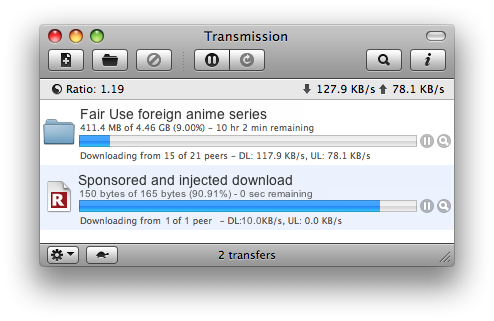Other
ISP modifying .torrent file contents
TorrentFreak reports that an Israeli ISP, Bezeq, is actually modifying the .torrent files, as they are downloaded by their customers.
Looking back almost a year, I’d just like to say — I told you so.
It works as follows. When a Bezeq International customer downloads a .torrent file the ISP will intercept it and add (!) a new tracker to it. The additional tracker is only accessible for Bezeq International customers and it connects to a high speed web-seed hosted on Bezeq International’s network.
Instead of blocking / throttling / capping / sending-threatening-letters or finding other ways of annoying their own customers for actually using the services they pay for, Bezeq caches popular downloads. The ISP saves on costs for having less traffic go outside of their own network, and customers actually end up with faster downloads. Still, this involves intercepting and modifying downloads, which makes me feel uneasy, as this could easily be turned the other way.
This concept will actually lessen the server load of hosting companies that host the file itself, well good for them.







If the data is cached within their network does it not mean they are storing and therefor potentially providing illegal copyrighted data?
Reply to comment
I’m sure that RIAA and MPAA will flip out over such a possibility, but the cache is non-moderated and contains “user content”, so ISP should be safe under safe harbour laws.
Reply to comment
Not really. All mail servers cache data. It’s automated thus they are not liable.
Also, they are in Israel, I doubt copyright’s are what they are worried about with War’s UN probes and the occasional suicide bomber.
Reply to comment
Why would you use an apostrophe in “copyrights”? It’s really not a difficult thing to understand. Read this: http://owl.english.purdue.edu/owl/resource/621/01/ It’ll stop you sounding stupid in the future.
Reply to comment
No, you are quite wrong Dan, in fact copyright is a very important.. AAAHHHHHHHHHHHHHHHHHHHHHHHAAAAHHHHHHHHHHHH!!
We are being attacked by the suicidal UN!!! AAAHHHHHHHHHHHHHHH!!!
Reply to comment
Data isn’t cached. The location of other local users on the torrent are.
Reply to comment
Bezeq’s cache likely has the largest porn collection on the planet.
Reply to comment
please don’t forget that using BT is legal in some countries so the MPAA and their like would have to be careful before they start complaining again.
here in spain for example i get my usage rights by paying a fixed amount which is included in the bill for my internet connection. like with empty micro cassettes in the 80’s
Reply to comment
And yet ADESE and UVE managed to convict a Spanish admin, for something that is technically legal.
http://torrentfreak.com/file-sharing-admin-convicted-for-crime-he-didnt-commit-090415/
It’s actually kind of messed up — the admin pleaded guilty to something he would not get convicted of, to avoid dealing with followup legal proceedings in the civil courts.
Reply to comment
In the last few months they’ve started doing this in China too. You can even see it happen over other protocols: QQ p2p file transfers, HTTP downloads, torrent trackers, etc.
Reply to comment
hmmm, they’re my ISP, gotta dig in to this.
Reply to comment
Finally someone did something good.
Reply to comment
who’s to say they’re not adding trackers for the purposes of TRACKING who is downloading, for the purpose of reporting this to the RIAA?
or what if they simply remove all of the trackers from the list?
Obviously good tracker websites list the addresses, such that they may be added back… and I imagine the next gen clients will start validating the integrity of the .torrent (file hash).
Reply to comment
This seems similar to the P4P that Verizon tried.
Is this different?
Reply to comment
Similar goals (reduce bandwidth costs), though instead of managing connections between local peers (or requiring support for a new protocol), Bezeq’s cache acts as a single high-speed seed.
Reply to comment
The RIAA just needs to muscle an ISP to add THEIR tracker. Then it gets interesting.
Reply to comment
Uhhh
Being a user of another ISP in Israel who does this (or something similar), I rather enjoy it.
But it’s far from being a new technique. There are a few caching products used by ISPs to cache bit torrent, ed2k and other types of p2p content.
So far, their cache gives me great download speeds, and legit content (fair use uncopyrighted material of course).
Reply to comment
That is pretty interesting and i don’t really think it can harm the users in any case, as long as they remain anonymous.
It’s funny, though, what the ISPs come up with in order to save bandwidth
Reply to comment
1
Reply to comment